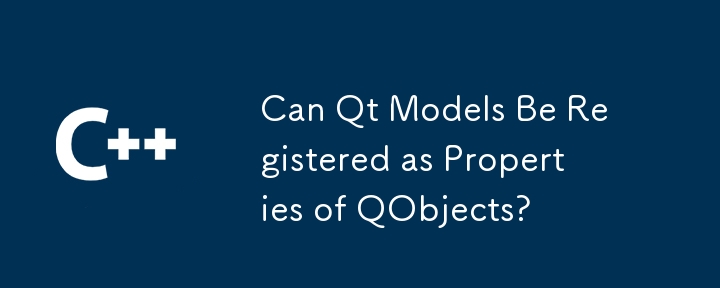Home >Backend Development >C++ >Can Qt Models Be Registered as Properties of QObjects?
Can Qt Models Be Registered as Properties of QObjects?
- Barbara StreisandOriginal
- 2024-12-24 18:34:04903browse

Can Qt Models Be Registered as Properties of QObjects?
To begin, let's clarify that Qt models can indeed be registered as properties of QObjects using macros. For instance, consider the AnimalModel from here:
http://doc.qt.io/qt-5/qtquick-modelviewsdata-cppmodels.html#qabstractitemmodel
Passing Models to Root Context
Passing models to the root context of QuickView is a straightforward method. Here's an example:
QuickView view;
view.rootContext()->setContextProperty("myModel", &model); // where "model" is the AnimalModel
Similarly, objects registered via Qml macros can be added to the view:
view.rootContext()->setContextProperty("obj", pDataObject);
QObject with Model Properties
However, what if you want a QObject that contains a model of any type of data? Here's an example implementation:
class DataObject : public QObject
{
Q_OBJECT
Q_PROPERTY(QString name READ name WRITE setName NOTIFY nameChanged)
Q_PROPERTY(QString color READ color WRITE setColor NOTIFY colorChanged)
...
AnimalModel m_modelAnimals;
// Q_PROPERTY(AnimalModel modelAnimals READ modelAnimals NOTIFY modelAnimalsChanged)
};
Contrary to the comment, this property registration is indeed possible, but instead of being an AnimalModel, it will be an AnimalModel *. As long as the model inherits from QAbstractListModel, you don't require the NOTIFY part. Changes within the model are automatically reflected.
Flexible Model Implementation
A more flexible approach is to create a model that stores QObject *. From QML, you can create diverse objects with various properties and incorporate them into the model. The model then provides a single role that returns the object, allowing you to query and utilize its properties.
Schema-less Models
In addition, you can implement a "schema-less" model by using QQmlListProperty and Q_CLASSINFO("DefaultProperty", "container"). This enables you to dynamically compose the model or use QML's declarative syntax. Importantly, this approach also provides the ability to add or remove objects declaratively.
Example of a Model with Dynamic Data
Here's an example implementation of a model that supports any type of data:
class List : public QAbstractListModel {
Q_OBJECT
QList<QObject *> _data;
Q_PROPERTY(int size READ size NOTIFY sizeChanged)
Q_PROPERTY(QQmlListProperty<QObject> content READ content)
Q_PROPERTY(QObject * parent READ parent WRITE setParent)
Q_CLASSINFO("DefaultProperty", "content")
public:
List(QObject *parent = 0) : QAbstractListModel(parent) { }
// rest of the class ...
};
This model can be used to hold any QObject or derived class, including QML's QtObject. It can serve as a model for a ListView and supports dynamic population through slots or declarative syntax. Furthermore, it handles object ownership and can be nested to create a compartmentalized tree model.
Loader for Delegate
For displaying different object types in a view, you can utilize a Loader for the delegate that loads the appropriate QML file based on the object's type.
Generic Sorting and Filtering Proxy
To enhance the usability of the model above, you can also implement a simple and dynamic generic sorting and filtering proxy. Here's an example implementation gist:
https://gist.github.com/gabor-boros/9e756b6dba5011c0286069feedbd3cc8
The above is the detailed content of Can Qt Models Be Registered as Properties of QObjects?. For more information, please follow other related articles on the PHP Chinese website!
Related articles
See more- C++ compilation error: A header file is referenced multiple times, how to solve it?
- C++ compilation error: wrong function parameters, how to fix it?
- C++ error: The constructor must be declared in the public area, how to deal with it?
- Process management and thread synchronization in C++
- How to deal with data splitting problems in C++ development

